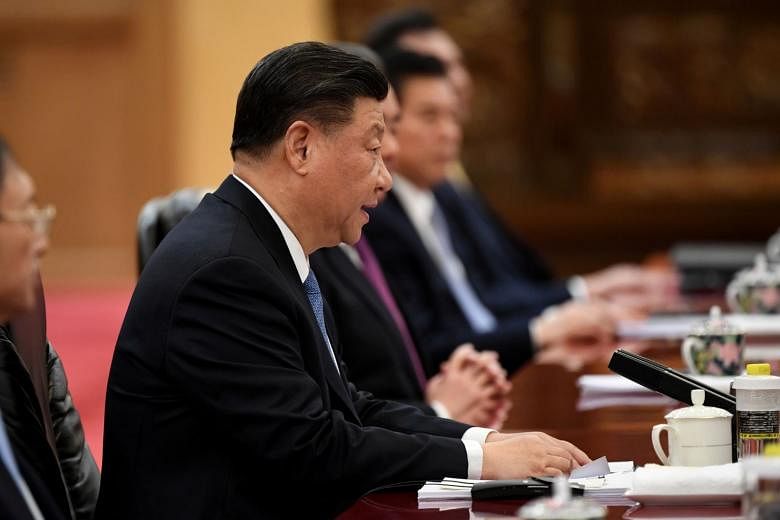CHENGDU, China (AFP) - China will host the leaders of squabbling neighbours South Korea and Japan on Tuesday (Dec 24), as Beijing flexes its diplomatic muscle to encourage a truce between America's two key military allies in Asia.
The trilateral meeting in the southwestern city of Chengdu, which will also address the regional challenge posed by North Korea, will include the first one-on-one between Japanese Prime Minister Shinzo Abe and South Korean President Moon Jae-in for 15 months.
Ties between Seoul and Tokyo have hit rock bottom in recent months over trade issues and other disputes related to decades of bitter wrangling over Japan's 1910-45 occupation of the Korean peninsula.
The United States has frequently urged its two allies to bury the hatchet, worried that their poor relations were complicating diplomacy in Asia - although it has held off on direct mediation.
"As the region's major power, China hopes to show its diplomatic presence to the world by bringing the Japanese and South Korean leaders to the same table," Haruko Satoh, professor and expert on Chinese politics at Osaka University, told AFP.
Beijing's role as diplomat could also help avert global attention from its domestic issues, Satoh suggested, including the ongoing pro-democracy protests in Hong Kong.
South Korean President Moon Jae-in said at a meeting with President Xi Jinping in Beijing Monday that he "highly" appreciates China's "important role in securing denuclearisation and peace on the Korean peninsula".
And at his own separate meeting with Xi in Beijing on Monday, Japanese Prime Minister Shinzo Abe said both China and Japan have a "big responsibility for peace, stability and prosperity" in the region.
Nuclear talks between Pyongyang and Washington remain deadlocked, and Pyongyang has threatened a "Christmas gift" to the US if it does not offer to ease the sanctions imposed on Pyongyang by the end of the year.
US officials believe that North Korea may test an intercontinental ballistic missile - which would destroy US President Donald Trump's argument that he has succeeded in reducing risks from North Korea.
"It will be important for China, South Korea and Japan to present a unified stance on Pyongyang," Yun Duk-min, former president of the Korea National Diplomatic Academy, told AFP.
'SEVERE' SITUATION
Before leaving for China, Abe told reporters at his office that links with Seoul remain "severe".
"But considering the security environment in East Asia, I recognise that relations between Japan and South Korea as well as relations among Japan, the US and South Korea are important," he said.
However, analysts have warned that the impact China can have is limited.
"There isn't much Beijing can do on the Seoul-Tokyo row," said Yun.
The relationship between Japan and South Korea is overshadowed by the 35 years of brutal colonisation by the Japanese - including the use of sex slaves and forced labour - that is still bitterly resented today.
Ties began a downward spiral in recent months after a series of South Korean court rulings ordering Japanese firms to compensate wartime forced labour victims, which infuriated Tokyo, who insisted the matter had been settled by a 1965 treaty between the two countries.
Seoul then threatened to withdraw from a key military intelligence-sharing pact, although it reversed course in November and agreed to extend it "conditionally".
The United States welcomed South Korea's decision, saying it "sends a positive message that like-minded allies can work through bilateral disputes".



